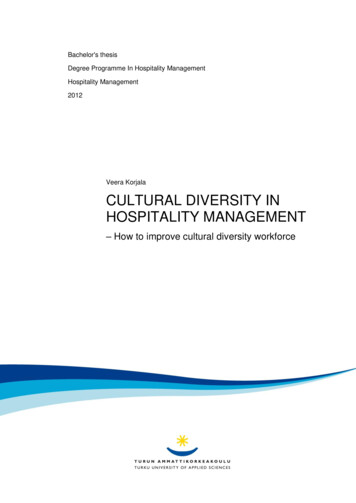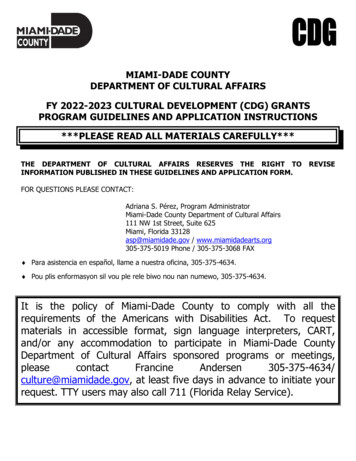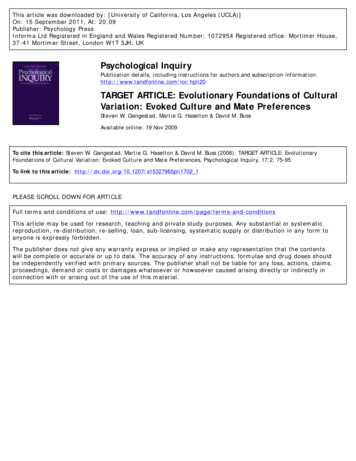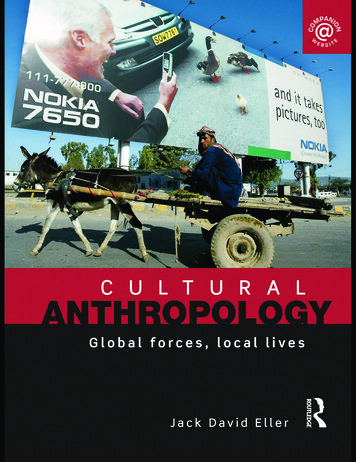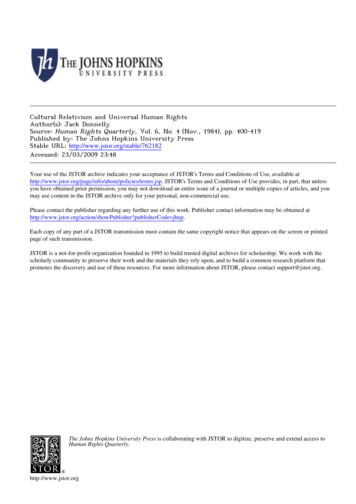
Transcription
Cultural Relativism and Universal Human RightsAuthor(s): Jack DonnellySource: Human Rights Quarterly, Vol. 6, No. 4 (Nov., 1984), pp. 400-419Published by: The Johns Hopkins University PressStable URL: http://www.jstor.org/stable/762182Accessed: 23/03/2009 23:48Your use of the JSTOR archive indicates your acceptance of JSTOR's Terms and Conditions of Use, available rms.jsp. JSTOR's Terms and Conditions of Use provides, in part, that unlessyou have obtained prior permission, you may not download an entire issue of a journal or multiple copies of articles, and youmay use content in the JSTOR archive only for your personal, non-commercial use.Please contact the publisher regarding any further use of this work. Publisher contact information may be obtained herCode jhup.Each copy of any part of a JSTOR transmission must contain the same copyright notice that appears on the screen or printedpage of such transmission.JSTOR is a not-for-profit organization founded in 1995 to build trusted digital archives for scholarship. We work with thescholarly community to preserve their work and the materials they rely upon, and to build a common research platform thatpromotes the discovery and use of these resources. For more information about JSTOR, please contact support@jstor.org.The Johns Hopkins University Press is collaborating with JSTOR to digitize, preserve and extend access toHuman Rights Quarterly.http://www.jstor.org
HUMAN RIGHTSQUARTERLYCulturalRelativismandUniversalHuman Rightslack Donnelly*Cultural relativity is an undeniable fact; moral rules and social institutionsevidence an astonishing cultural and historical variability.Culturalrelativismis a doctrine that holds that (at least some) such variations are exempt fromlegitimate criticism by outsiders, a doctrine that is strongly supported bynotions of communal autonomy and self-determination. Moral judgments,however, would seem to be essentially universal, as suggested not only byKant's categorical imperative but also by the common sense distinctionbetween principled and self-interested action. And if human rights are,literally,the rights(every)one has simply because one is a human being, theywould seem to be universal by definition.How can the competing claims of cultural relativism and universalhuman rights be reconciled? In this article I shall try to specify the nature oftheir relationship, and argue for an approach that preserves the tensionbetween, and the insights of, both relativism and universalism.DEFINING "CULTURALRELATIVISM"The two extreme positions on cultural relativism can be called radicalcultural relativismand radical universalism. Radicalcultural relativismwouldhold that culture is the sole source of the validity of a moral right or rule.Radical universalism would hold that culture is irrelevant to the validity ofmoral rights and rules, which are universally valid.* Rhoda Howard's criticisms of earlier drafts forced me to greater clarity and precision, andsaved me from several errors-although I have stubbornly insisted on leaving a few inhere. John Vincent started me thinking along these lines and provided helpful commentson an earlier draft. Ted Lewellen offered useful observations from an anthropologist'spoint of view. I am grateful to them for their help.400
CulturalRelativism401These radicalviews are ideal types that markthe end pointsof a continuum. The body of that continuum, those positions involvingvaryingmixes of relativismand universalism,can be roughlydivided into what wecan call strongand weak atcultureis the principalsource of thevalidityof a moralrightor rule.Inotherwords,the presumptionis thatrights(and other social practices,values, and moral rules) are culturallydetermined, but the universalityof humannatureand rightsservesas a check onthe potential excesses of relativism.At its furthestextreme, just short ofradicalrelativism,strongculturalrelativismwould accept a few basic rightswith virtuallyuniversalapplication,but allow such a wide rangeof variationfor most rightsthat two entirelyjustifiablesets mightoverlaponly slightly.Weakculturalrelativismholds thatculturemay be an importantsourceof the validityof a moral rightor rule. In other words, there is a weakpresumption of universality,but the relativityof human nature, communities,and rightsservesas a check on potentialexcesses of universalism.At its furthestextreme, just short of radical universalism,weak culturalrelativismwould recognize a comprehensiveset of primafacie universalhuman rightsand allow only relativelyrareand strictlylimitedlocal variations and exceptions.Strongand weak are relativeterms referringto the extent of culturalvariationpermitted.We mustbe careful,however, not to use merelyquantitativemeasuresof relativism;qualitativejudgmentsof the significanceofdifferentculturalvariationsmust also be incorporated.Acrossthe continuumof strongand weak relativismsthere are severallevels or types of relativity.Ina roughway, three hierarchicallevelsof variation can be distinguished,involvingculturalrelativityin the substanceof listsof humanrights,in the interpretationof individualrights,and in the forminwhich particularrightsare implemented.The rangeof permissiblevariationat a given level is set by the next higherlevel. Forexample,"interpretations"of a rightare, logically,limitedby the specificationof the substance of aright.The range of variationin substance is set by the notions of humannature and dignity,from which any list of human rightsderives. In otherwords, as we move "down"the hierarchywe are in effectfurtherspecifyingand interpreting,in a broadsense of that term, the higherlevel.I shallultimatelytryto defenda weak rds primarilyatmitslimiteddeviationsfrom"universal"the levelsof formand interpretation.On the way to thisconclusion,I argue,in the followingsection, that radicalrelativismand radicaluniversalismare1. Culturalrelativism,of course, appliesprimafacie to practicesand moralstandardsotherthan human rights,but henceforthI shall be concerned here almost exclusivelywithculturalrelativistargumentsapplied to human rights,and in particularlists of humanrightsin widely accepted internationaldocumentssuch as the UniversalDeclarationofHumanRights.
402DONNELLYmisguided. I then explore, in greater detail, the levels and types of culturalrelativism, and address the problem of the cultural basis of relativism.Finally,in the last two sections, I try to show that the internationalconsensusrepresented by the Universal Declaration of Human Rightsand the International Human RightsCovenants, in the conditions of the modern world, support a weak cultural relativistapproach to human rights;that is, an approachthat views human rights as prima facie universal, but recognizes culture as alimited source of exceptions and principles of interpretation.A NECESSARYTENSIONRELATIVITYAND UNIVERSALITY:The dangers of the moral imperialism implied by radical universalism hardlyneed be emphasized. Radical universalism, however, is subjected to othermoral objections as well.Moral rules, including human rights, function within a moral community. Radical universalism requires a rigid hierarchical ordering of the multiple moral communities to which individuals and groups belong. In order topreserve complete universality for basic rights, the radical universalist mustgive absolute priorityto the demands of the cosmopolitan moral communityover all other ("lower")moral communities. This complete denial of nationaland subnational ethical autonomy and self-determination is dubious at best.Even if the nation is a doomed, transitory stage in the development ofhuman moral community, there is no logical or inescapable moral reasonwhy peoples cannot accept or choose it as their principal form of socialorganization and the primary locus of their extrafamilialmoral and politicalcommitments. Once we allow the moral validity of such commitments, weare bound to accept at least certain types of substantive moral variability,including variabilityin human rights practices.Such moral "nationalism"may be based on reasons such as an inabilityto agree on the structure of a supranational organization or a fear of creatingan instrument of universal tyranny. More directly moral reasons might alsobe advanced, such as the advantages of international diversity provided by astrong commitment to national or local customs. Most importantly, it restson the notion of self-determination. But however it is justified-and thevarious arguments are likely to be mutually reinforcing-at least certainchoices of such moral communities demand respect from outsiders; notnecessarily uncritical acceptance, let alone emulation, but in some cases atleast, tolerance. Therefore, radical universalism cannot be justifiably maintained.This is perhaps too strong a conclusion. There may be some formal principle, such as the universalizabilityof moral judgments, that might plausiblybe argued to be universally valid. There may even be a very short list ofuniversal rights. Advocates and theorists of human rights, however, rarely ifever restrictthemselves to either of these extremely limited claims. For any
CulturalRelativism403robustsubstantivelist of basic human rights-for example, the lists in theUniversalDeclarationof HumanRightsand the InternationalHumanRightsCovenants-at least some allowance must be made by outsidersfor thespecial practices of national and other noncosmopolitan moral communities.A culturalrelativistaccount of human rights,however, seems to beguiltyof logicalcontradiction.Ifhumanrightsare basedin humannature,onthe simplefact thatone is a humanbeing, and if humannatureis universal,then how can human rightsbe relativein any fundamentalway?The simple answer is that human nature is itself in some measureculturallyrelative.Thereis a sense in which this is trueeven at the biologicallevel; for example, if marriagepartnersare chosen on the basis of largelyculturalpreferencesconcerningheight,weight, skintone, or other physicalattributes,the gene pool in a communitywould be alteredin ways equivamechanismsof selection. More importantly,culture canlent to "natural"the presenceand expressionof manyless easilyquaninfluencesignificantlytifiedaspectsof humannature,for example,by encouragingor discouragingthe developmentor perpetuationof certainpersonalitytypes.The impact of cultureon the shapingof individualsis systematicandmay lead to the predominance of distinctive social types in differentcultures. There can be little doubt that there are important,structurallydetermineddifferences,for example, between the modal"natures"of menand especiallywomen in modernwesternand traditionalIslamicsocieties.In any particularcase, "humannature,"the realizednatureof real humanbeings, is a social as well as a "natural"product.Whether we conceive of this process as involvingculturalvariationaround an inalterable"natural"core or largelyculturalvariationwithin aphysiologicallyfixed range, there is an undeniablesocial side to humannature,at least insofaras that nature is expressed. Human nature,at thelevels of the individual,the group, and the species alike, is a range ofpossibilities,varying,in partin responseto s;it is as much a project,and an individualand socialdiscovery, as a given. Even if all behaviorshould prove to be ultimatelygenetic, the expressionof thatgenetic endowment- whichalso meritsbeingcalled "humannature"-is in considerablemeasureculturallydetermined.ElsewhereI have sketcheda theoryof humanrightsconsistentwithsuchan account of human nature.2Here I simplywant to stressthatthe culturalvariabilityof human nature not only permits but requires significantallowancefor crossculturalvariationsin human rights.32. Jack Donnelly, The Concept of Human Rights, forthcoming, Chapter 3.3. Note that I am not arguing that all such cultural variations are morally justifiable; below, Iwill argue explicitly that they are not. My point is that some such variations are justifiable,on a variety of moral and practical grounds. Particular arguments concerning thejustifiability of individual practices, however, are largely beyond my scope here.
404DONNELLYBut if all rights rested solely on culturally determined social rules, asradical cultural relativism holds, then there could be no human rights, norights one has simply as a human being. This denial of human rights isperfectly coherent. Furthermore, as I have argued elsewhere, "traditional"societies generally do not recognize rights held simply because one is ahuman being.4 Nonetheless, I shall argue that radical cultural relativism ismorally indefensible today.The strongest form of radical cultural relativismwould hold that the concept "human being" is of no moral significance; the mere fact that one is ahuman being is irrelevant to one's moral status. It is true that premodernsocieties typically have not recognized "human being" even as a descriptivecategory, but instead define persons by social status or group membership.For example, the very names of many cultures mean simply "the people"(e.g., Hopi, Arapahoe), and their origin myths define them as separate fromoutsiders, who are somehow "not-human." Similarly, in ancient Greecethere were Hellenes and barbarians.This view, however, is almost universally rejected in the contemporary world.For example, chattel slavery and caste systems, which implicitly denythe existence of a (morallysignificant)common humanity, are almost universally condemned, even in the most rigid class societies. Likewise, the basicmoral distinction between insiders and outsiders has been seriously erodedby greatly increased individual mobility and by an at least aspirational commitment to the idea of a universal human moral community.Today there is near universal international agreement, at least in theory,although often not in practice, that certain things simply cannot legitimatelybe done to human beings- regardless of the difficulties in specifying thosethings.5 Failure to act or even speak out against the grossest affronts tohuman dignity overseas on the grounds of cultural relativism would bewidely- and I believe correctly- perceived as moral cowardice.6Even more strikingis the apparent crosscultural consensus on a few particular practices that cannot be justified by even the hoariest of traditions,and certainly not by any new custom. For example, the prohibition of torture and the requirement of procedural due process in imposing and exe4. JackDonnelly,"HumanRightsand HumanDignity:An AnalyticCritiqueof Non-WesternConceptions of Human Rights,"American PoliticalScience Review 76 (une 1982),303-316.5. Suchinternationalagreement,of course,tendsto reflectprimarilythe views of those whoare politicallyactive in the modernsector. Exceptions,therefore,continueto exist, particularlyin relativelyisolated areas where status-basedsocieties still persistwith somevigor. Nonetheless, I would argue that even such exceptions are subjectto defensible(althoughperhapsnot necessarilydecisive)criticism,on groundsdiscussedbelow.6. CompareR. J. Vincent,"HumanRightsand CulturalRelativism"Paperpresentedat ualConventionof the International1984. Thisarticleis largelythe resultof myeffortsto come to gripswiththe issuesraisedinVincent'spaper.
CulturalRelativism405cuting legal punishmentsseem to be accepted as bindingby virtuallyallcultures, despite profound differences in specifying the practical andsubstantivemeaningsof these notions.The radicalrelativistmight respond that such consensus is irrelevant.Logically,this is correct;crossculturalconsensusdoes not necessarilyentailany additionalforce for a moralrule. Nonetheless,I would submitthat virtuallyall people do view such consensus as addingsubstantialforce to therule, and thus in an importantsense this sort of radicalrelativism,whilelogicallyimpeccable,is morallydefective.In effect, a moral analog to customary internationallaw seems tooperate. If a practice is nearly universal and generally perceived ethat practiceof allmembersof the community,and preclude the legitimatedevelopmentofalternativepractices.There is-or at least one might plausiblyargue thatthere is-a weak cosmopolitanmoralcommunity,which imposes minimalsubstantivelimitationson the rangeof permissibleculturalmoralvariation.Notice, however, that I have argued only that there are at least a fewcrossculturallyvalid moralvalues.This still leaves open the possibilityof aradicalculturalrelativistdenial of humanrights.Such an argumentwouldhold thatwhile there may be universalmoralrulesor values,humanrightsinalienableentitlementsheld equally by all, groundingparticularlystrongclaims that may be made against the state and society-are but one ofseveraldefensiblemechanismsto protecthumandignity(whichin any caseis largelya culturallydeterminednotion).7Plausibleargumentscan be advancedto justifyalternativemechanismsto guaranteehumandignity;for example, naturallaw, which imposestransculturalmoralobligationsthatare not correlativeto rights.8Fewif any states,however, actuallyadvance such arguments.Inthe First,Second, and ThirdWorldsalike,a strongcommitmentto humanrightsis almostuniversallyproclaimed, even where practicethrowsthat commitmentinto question.It is too easy to dismisssuch proclamationsas mere rhetoricalfashion;such a widespreadinternationalmoral"fashion"musthavesome substantivebasis. That basis, I would suggest, is the moral hazard presented by themodernstate.Traditionalrulersusuallyfaced substantialmorallimitson theirpoliticalpower, customarylimitsentirelyindependentof humanrights.Furthermore,the relativetechnologicaland administrativeweakness of traditionalstates7. The argument here rests on the conceptual distinction between rights, in the strong senseof titles grounding claims of a special type, and righteous; that is, between rights, in thesense in which one has rights, and (mere) righteousness, in the sense in which somethingis right. For a further discussion of this distinction, see Donnelly, note 3 above, Chapter 1and Vincent, note 6 above, 303-306.8. Compare Jack Donnelly, "Natural Law and Right in Aquinas' Political Thought," WesternPolitical Quarterly 33 (December 1980), 520-535.
406DONNELLYand racticalrestraintson arbitraryabusesof power. Insuch a world, at leastsome humanrightsinalienableentitlementsof individualsheld againststate and society- mightplausiblybe held to be superfluous(inthe sense that basicdignitywas beingguaranteedby alternativemechanisms)if not positivelydangerousto wellestablishedpracticesthat realizeda culturalconception of humandignity.Sucha world,however,existstodayonly in a relativelysmallnumberofisolatedareas. And the modern state, particularlyin the ThirdWorld, notonly operates relativelyfree of the moralconstraintsof custom but has fargreateradministrativeand technologicalreach. It thus representsa seriousthreatto basichumandignity,whetherthatdignityis definedin "traditional"or "modern"terms.To the extent that modernizationor Westernizationhas reached into,and transformed, traditional communities, traditional approaches toguaranteeinghuman dignity seem objectively inappropriate;traditionallimitson politicalpowerare unlikelyto functioneffectivelyin modernconditions. In such circumstances-to which we will return in more detailbelow-at least certain basic human rights seem necessary ratherthanoptional.In mostinstances,then, radicalor unrestrictedrelativismis as inappropriateas unrestricteduniversalism;some sort of intermediatepositionisrequired.9Thisrequiresus to considerin greaterdetailthe variouslevelsandtypes of culturalrelativism.LEVELSAND TYPESOF RELATIVISMIn discussingforeign practices,we can distinguishbetween what can becalled "internal"and "external"evaluations. An internal judgment askswhetherthe practiceis defensiblewithinthe basic value frameworkof thatsociety; the issue here is whether a plausibleand coherent defense of thecriticism.Practicesthatdopracticecan be made in responseto universalisticnot even stand up to such evaluationscan in no sense be defended onculturalterms.An externaljudgmentappliesthe standardsof the evaluator(modified,as appropriate,by relativisticarguments)in orderto determinewhetherthe practicecan or shouldbe accepted or defended,all thingsconsidered. Clearlythe most importantcontroversiesare likelyto arise overpracticesthat are defensibleaccordingto internalstandardsbut unacceptable by externalstandards;these are the practiceswe are most concernedwith in the discussionof culturalrelativismand universalhuman rights.To a considerabledegree this distinctionbetween internaland external9. Note thatthisargumentis largelyempiricaland functional.Whileothersmaywishto constructa moreambitious,"universal"argumentfor humanrights,I shallrestrictmyselfhereto this historically"limited"horizon.
CulturalRelativism407evaluations matches up with, and further elaborates, the distinctionbetween strongand weak culturalrelativism;the strongerone's relativism,the greaterone's relianceon internalevaluations.It also helps to elucidatethe dilemmawe face in judgingculturallyspecific practices,torn betweenthe demands of relativismand universalism,demands that requireus torenounce radicalrelativismand radicaluniversalismin favorof some combinationof internaland externaljudgments.As I have alreadyemphasized,relativismrestson the notionsof moralautonomy and communal self-determination.Respect for autonomousmoralcommunitieswould seem to demandinternalevaluations.Butto relyentirelyon internaljudgmentswould seem to abrogateone's moralresponsibilitiesas a memberof the cosmopolitanmoralcommunity;such membership would seem to demand the applicationof universalstandardsinexternaljudgments.Membershipin one's own nationalor local moralcommunityalso mightdemand (a differenttype of) externaljudgments.Furthermore, moral judgmentsby their nature are universal,or at least universalizable,even thoughwe know that moralvaluesand particularjudgmentsare, at least in partand in theirgenesis, historicallyspecificand contingent.The choice between internaland externalevaluationsthus is itself amoralchoice. However,the choice is not entirelyfree or simplya h system-the "universal"the cosmopolitanmoralcommunity,the standardsof one's home community, and those of the foreign community whose practice is beingevaluated-we can rankpracticesin termsof theirmoralworth.As a generala practicewithina particularrule,we can suggestthatthe more"important"system,the greaterthe force of internalstandards,which can be overriddenonly by particularlystrongexternaljudgments.Such a generalrule hardlysolves all our problems.Besidesthe obviousdifficultiesof providingeven a very crude system for weighingcompetinginternal and external standards,in some instances at least "important"values, judged by externalstandards,will compete with internally"important"values or practices,presentinga dilemma of immense proportions.However,such a rulecan greatlysimplifythe processof evaluation- assuming we are able to make at least roughinternaljudgmentsof "importance."As I noted above, strongand weak relativismcannot be distinguishedstandards;solely by the numberof deviationsthey allow from"universal"some qualitativemeasurealso is required.The distinctionbetween variations in substance,interpretation,and formis a usefulplaceto begindiscussthisissue.ingEven very weak cultural relativists-that is, relativelystrong universalists- are likelyto allow considerablevariationin the formin which mostrights are implemented. For example, whether free legal assistance isrequiredby the rightto equal protectionof the laws is best viewed as atechnical issue of the form in which the rightis implemented,and thus
408DONNELLYlargely beyond the legitimate reach of universal standards. Importantdifferences between strong and weak relativistsare likely to arise, however, whenwe move to the levels of interpretation and substance.While the distinction between variations in form and in interpretation isdifficult to draw with precision, it is fairly clear and quite important, as wecan see by looking at a particularright,such as the rightto political participation. In specifying the right to political participation, we can begin bydistinguishing electoral from nonelectoral forms of participation. We canalso distinguish direct democracy from representative government, and bothof these from participation through occasional plebiscites. Representativeelections can be further divided into relatively open and closed multipleparty and one-party elections. We can also distinguish elections wherevoting is a basic right from those where it is a privilege or even a duty, elections intended to determine the will of the people from elections that serveprincipallyto mobilize popular support for government policy, and so forth.All of these variations in "interpretation"clearly are qualitatively differentfrom questions of form such as how often elections, town meetings, orplebiscites will be held.Butwhile all these mechanisms represent plausible interpretationsof theright to political participation, we need not- and should not- hold that all"interpretations"are equally plausible or defensible. They are interpretations,not free associations or arbitrarystipulations; the meaning of "the right topolitical participation" is controversial, but the range of controversy islimited by the concept. For example, an election in which a people wereallowed to choose an absolute dictator for life-"one man, one vote, once,"as a West African quip puts it- in no way represents a defensible interpretation of the right.Particular human rights are like "essentially contested concepts," inwhich there is a substantial but rather general consensus of meaning, coupled with a no less important, and apparently unresolvable, conflict of interpretations.10 In such circumstances, culture provides one plausible anddefensible mechanism for selecting interpretations (and forms). Nonetheless, there are strong conceptual limits on the acceptable range of variation.In addition to essential contestability, scarcity also implies permittingvariations in form and interpretation. The effective political implementationof virtuallyall human rightsconsumes resources. While frequently noted foreconomic and social rights, this is equally true of many civil and politicalrights. For example, there are significant direct costs, as well as indirect costssuch as the diversion of resources, in running an election, operating a legalsystem in accord with principles of due process, and protecting citizens10. See W. B. Gallie, "Essentially Contested Concepts," Philosophy and the HistoricalUnderstanding (New York: Shocken Books, 1964), 157.
CulturalRelativism409againstarbitraryor inhumaneand degradingtreatmentby officialsof thestate."Fiscal constraints may also require difficult decisions concerningpriorities,decisionsthat are in parttied to culture.In settingsuch priorities,however,an especiallyextremeemphasisor deemphasisof a right(orset ofrights)bringsus to the edge of the thirdtype of relativity,namely,variationsin substance,differencesin listsof human rights.inRightsthat varyin formand interpretationstillare clearly"universal"an importantsense, particularlyif the substantivelist of rightsis relativelyuniversal.But while variationsin substance involve much more extremerelativity,even here talk of universalitycan be meaningful.Ifwe look at complete listsratherthanparticularrights,there may be anessentialuniversalityeven in the midstof considerablesubstantivediversity.Such universalitymay take the formof a largecommon core with relativelyfew differences "around the edges." It may involve strong statisticalregularities,in which outliersare few and are clearlyovershadowedby thecentral tendency. There may be clusterings,or lesser but still significantin a very extended sense.overlaps,that allow us to speak of "universality"and"minor"And if we distinguishbetween "major"rights,we mighthavestillanother sort of universalityamidst substantivediversity:the definitionofsuch categoriesis of course extremelycontroversial,but to the extent thatvariationsin substanceare concentratedamong"minor"rights,a fundamental universalitywould be retained.The extentto which the listedrightsare aggregatedis anotherimportantconsideration.At the level of broad categories such as civil, political,economic, and social rights,there is widespreadagreement-except for averysmallminoritythatstillrejectseconomic and social rights-that "universality"is required;any defensible list must include rightsfrom all thesecategories.As we disaggregate,however, the permissiblerangeof relativityexpands, in part because each listed right is more minor,"and in partin a broadsensebecausedisaggregationis largelya processof interpretation,of that term.Consider,for example, the rightto work, which is almost universallyrecognizedin disaggregationsof economic rights.Thisrightmightbe interpreted as a rightto seek employment,to be compensatedfor unemployment, to be employed, or even a rightto employmentappropriateto one'sinterestsand talents.Certainrightsspecifiedat this level, however, will bemissingfromsome defensiblelistsof humanrights,includingmanyliststhatrecognize a rightto work. Furtherdisaggregation-forexample, specifying11. CompareHenryShue, "Rightsin the Lightof Duties,"in HumanRightsand U.S. ForeignPolicy, ed. PeterG. Brownand ),65-81 and HenryShue,BasicRights:Subsistence,Affluenceand ss,1980), 35-53.
special practices of national and other noncosmopolitan moral com- munities. A cultural relativist account of human rights, however, seems to be guilty of logical contradiction. If human rights are based in human nature, on the simple fact that one is a human being, and if human nature is universal,





